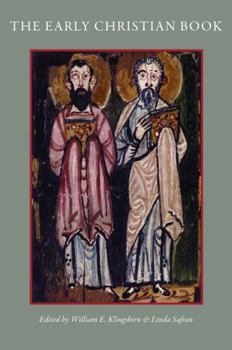The Early Christian Book
(Part of the CUA Studies in Early Christianity Series)
Select Format
Select Condition 
Book Overview
From the very beginning Christianity was a religion of books?a lived, but also a written faith. The essays in this collection focus on the ways in which books were produced, used, treasured, and conceptualized in the early Christian centuries (AD 100?600). During this crucial period, just after the New Testament writings were composed, Christianity grew from the religion of a tiny minority in the eastern Roman Empire to the religion of the empire itself, and beyond. To no small extent, this success was based on the power of its books. Written by experts in the field, the essays in this volume examine the early Christian book from a wide range of disciplines: religion, art history, history, Near Eastern studies, and classics. Topics include theories of the book, book production and use, books as sacred objects, and problems of gender, authorship, and authority. By examining Christian books from multiple perspectives, this book invites readers into the entire "bookish" world of early Christianity: a world of writing and reading practices, of copying and exchanging texts, of persuading and debating with books, and of representing holiness and power through codices of the law, the scriptures, and the lives of the saints. Essays cover a wide geographical range and discuss texts written all across the Mediterranean world?in Greek, Latin, Coptic, Syriac, and Hebrew. All ancient texts are translated into English, some for the first time. Intended for general readers, students, and scholars alike?anyone with a serious interest in early Christianity?this work brings together exciting currents of new research. It also opens up fresh questions and lines of inquiry in the study of this perennially important and fascinating subject. An introduction by Philip Rousseau provides a valuable overview, followed by essays written by Daniel Boyarin, Catherine Burris, Catherine Chin, Gillian Clark, Catherine Conybeare, Kim Haines-Eitzen, Caroline Humfress, Chrysi Kotsifou, John Lowden, Claudia Rapp, Daniel Sarefield, and Mark Vessey. A comprehensive consolidated bibliography and index complete the work. ABOUT THE EDITORS: William E. Klingshirn is professor of Greek and Latin at the Catholic University of America. Linda Safran is associate professor of Fine Art at the University of Toronto. PRAISE FOR THE BOOK: "[T]his book as a whole will be important and pleasant reading for anyone seriously interested in Late Antiquity, while individual articles will be useful teaching resources." ? Ian H. Henderson, Bryn Mawr Classical Review "Essays are written by formidable experts representing various disciplines. Art historian John Lowden provides insights on the luxury book through a meticulous study of treasured book covers, particularly those made of precious gems and metals. Catherine Burris approaches the Syriac Book of Women from the religious standpoint of Old Testament meeting New Testament, and aptly identifies the numerous subtleties inherent in aligning these texts. Historian Claudia Rapp's brilliant use of sources contextualizes for readers "holy texts, holy men and holy scribes," evoking the society and mind-set that enabled Christianity to flourish. The essays, illustrations, extensive bibliography, and authors' notes all are valuable in understanding the many facets of the book in the early centuries (100-600 CE). Summing up: Recommended." ? L. Doumato, Choice "[Readers will] be left with a satisfying sense of having gained an insight into a wide range of stimulating topics. . . . This collection is provocative in its ideas, full of fascinating details, and on the whole very readable. The book is beautifully produced, with seventeen illustrations, and finishes with a comprehensive bibliography and a general index." ? C. White, Journal of Theological Studies
Format:Paperback
Language:English
ISBN:0813215315
ISBN13:9780813215310
Release Date:February 2008
Publisher:Catholic University of America Press
Length:358 Pages
Weight:1.26 lbs.
Dimensions:1.0" x 6.0" x 9.0"
Customer Reviews
0 rating





